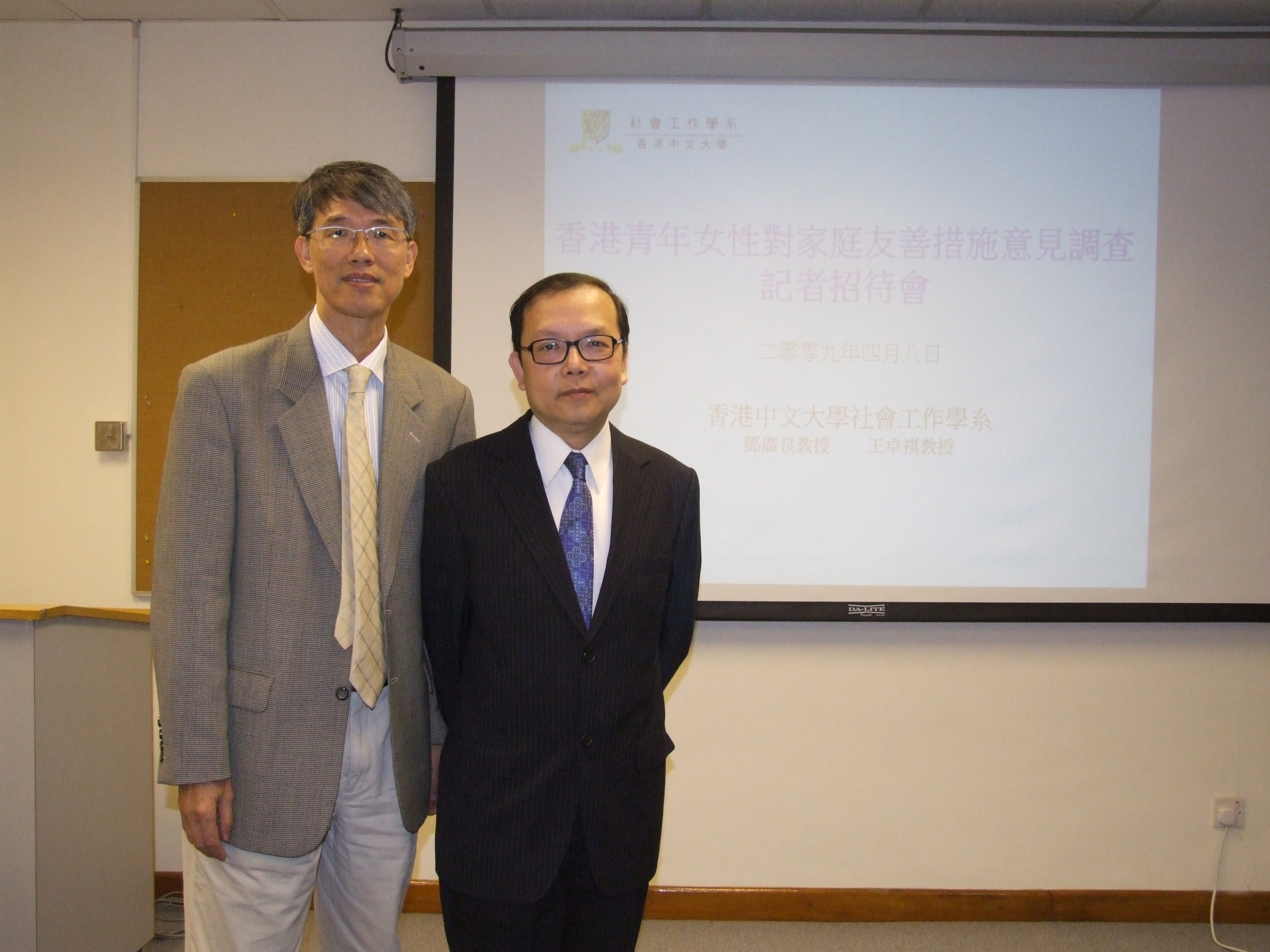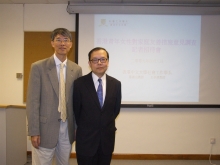CUHK
News Centre
CUHK Social Work Department’s Survey IdentifiesUrgent Need for More Family-friendly Policies for Young Women
In his recent policy addresses, Chief Executive Donald Tsang has twice mentioned enhancing ‘family-friendly’ working environments. A new survey of young women by the Department of Social Work at The Chinese University of Hong Kong (CUHK) shows that the Government has plenty of work remaining.
The survey found high levels of support for eight ‘family-friendly’ proposals. As many as 67% of the women surveyed said that such policies would be ‘important’ or ‘very important’ in their decisions about re-entering the workforce, and around 40% added that these policies would be ‘important’ or ‘very important’ in their decisions about having children. The degree of support for the eight policy proposals ranged from 87.7% (for the full launch of a five-day work week) to 74.6% (for tax reductions or subsidies to encourage women to have children). More than 73% of the women surveyed said these proposals should be implemented ‘urgently’ or ‘very urgently’.
‘As society keeps changing, the contradiction between women’s family responsibility and participation in society deepens,’ said Prof. Tang Kwong-leung, Chair Professor of the department. ‘In his 2005–06 and 2008–09 Policy Addresses, Mr. Tsang said the Government would encourage the business sector to help employees to strike a balance between work and family life. However, many employees feel stressed and long working hours greatly upsets the balance between work and family life. Many women choose to have late marriage, late reproduction and even no reproduction due to stress at home or at the workplace. There is a low degree of awareness and popularity of family-friendly measures in companies or organizations.’
Prof. Tang also cited a 2006 report jointly published by the Equal Opportunities Commission and the Women’s Commission, which showed that the extension of working hours was a common phenomenon.
‘The implementation of family-friendly measures can bring in a lot of benefits such as increasing the sense of belonging to a company or an organization, enhancing morale and reducing work stress,’ said Prof. Tang. ‘As it is now very common for women to work, the problem of balancing work and family life will be getting more and more serious. Therefore, public attitudes towards family-friendly measures and the impact of these measures on young women’s decisions about working and reproduction are issues worthy of our attention and exploration.’
The Department of Social Work at CUHK conducted a telephone survey on the views of young women on family-friendly policies from 2 to 17 June 2008. The survey interviewed 733 female respondents who spoke Cantonese or Mandarin and aged between 20 and 39. The response rate was 66.5%.
Thirty-nine per cent aged between 20 to 29, and 61% aged between 30 and 39. 43.1% had attained tertiary education or above, and more than one-third (37.5%) held positions such as senior executives, professionals or associate professionals. 30.2% had personal incomes above $20,000, while about 59.6% were married and about half (49.1%) had children (Table 1).
Survey results:
(A) Work stress, family planning and personal background
The survey found that 32.7% of respondents intended to have children (Table 2). According to Chi-square analysis, age, education level, marital status and the number of children under the age of 13 were factors that may influence their decision on having children. About half of those aged from 20 to 29, with tertiary or above education level, unmarried and about 20% of those who had one child under age 13 intended to have children. It is worth noting that only two of 10 married couples intended to have children (Appendix 1).
In balancing work and family life, 44.6% (occasionally) and 30% (always) of the respondents felt stressed about balancing work and family life (Table 2). Age and marital status were significantly correlated with the balance of work and family life, and about 40% of married women of 30 to 39 years old often felt more stressed. However, the level of education, job status, income and the number of children under age 13 did not show a significant impact (Appendix 1).
(B) The degree of support for family-friendly measures
The majority of women surveyed supported various aspects of family-friendly measures. Table 3 shows that most young women supported the implementation of five-day work week, with nearly 90% (87.7%) favoring the full launch of the policy. About 80% of the respondents supported fully launching flexible working hours (82.8%) and allowing voluntary shift or job swaps, or reduction in working hours (79.7%). As for child care, nearly 90% supported fully launching child-care services for children younger than three years old (87%), and child care or after-school care for children aged between three and 12 (86.1%).
On maternity leave, more than 80% of respondents were in favor of introducing paternity leave (87%) and increasing the statutory maternity leave (80.6%). Regarding tax policies, the levels of support were somewhat lower, but 74.6% of respondents still expressed support for encouraging birth by tax reduction or subsidies. As for the urgency of the implementation of the measures, more than 70% (73.3%) saw an urgent or very urgent need. All of the above-mentioned family-friendly measures scored above the median of 2.5 on a four-point scale (1 = strongly disagree; 4 = strongly agree).
(C) Family-friendly measures: employment and birth decisions
The most important factor for employment considerations was child care service, especially for children under three. It was followed by working hour arrangements. Maternity leave and tax incentives seemed less significant. Specifically, a large majority of the respondents said fully launching child care services for children younger than three years old (67%) and child care or after-school care for children between three and 12 years old (62.4%) were very important to their decisions about being employed or re-employed. As for working hour arrangements, more than half of the respondents considered flexible working hours (63.3%), a five-day work week (61.2%) and voluntary shift or job swaps, or reduction in working hours (57.6%) important or very important when considering getting employed or re-employed (Table 4).
Concerning maternity leave and tax incentives, many of the respondents also considered paternity leave (29.6%), increases in statutory maternity leave (47.7%), and tax reductions or subsidies to encourage birth (47%) important or very important to their decisions (Table 4). The average scores of all child care and work arrangement measures were higher than the median of 2.5 at 2.65 to 2.84 (Table 4).
As for the impact of these family-friendly measures on reproductive decisions, the percentages of respondents considering the measures important/very important were 30.3 to 47.2%, lower than that for the employment decision. Although tax reductions or subsidies were considered the least important in considering employment and re-employment, they were the most important factors in the decisions about giving birth, though the percentages were almost the same, 47.2% with a 2.5 average. Similar to the impact on employment, the fewest respondents considered paternity leave important or very important, scoring 30.3% with an average of 2.26. As for child care and working hour arrangements, both had about 40% respondents considering them important/very important, about 20% lower than that for the employment decision (Table 5).
Conclusion:
In conclusion, most respondents were very supportive of the family-friendly measures, agreeing that there was an urgent need for these measures. Child care services and arrangement of working hours were most important to women’s decisions on employment and giving birth. In addition, although the support for tax incentives was less than 80%, the measure was important to women’s decision on giving birth and those who were stressed out by juggling work and family. Furthermore, compared to the decision on getting employed or re-employed, giving birth is a decision that involves more meticulous deliberation, and the factors for consideration were not exhausted by the survey. The Government should respond to the public opinions by providing more child care and nursery school/child care, and drawing on experiences of other countries to introduce more family-friendly measures. The Government should, at the same time, play an active role in urging the business sector to launch family-friendly measures such as flexible working hours.





